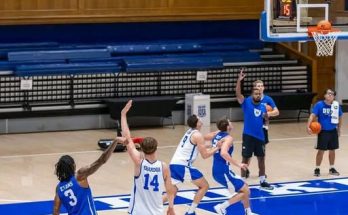Tennessee’s Josh Heupel Can Only Hope Their Transfer Portal Estimate Was Correct
The Tennessee Volunteers football program has seen significant changes under head coach Josh Heupel’s tenure. The once-struggling team has found new life, posting strong offensive numbers and climbing back into SEC relevance. But as college football continues to evolve, one element has become a pivotal part of a program’s success: the transfer portal.
This offseason, Tennessee has been aggressive in using the portal to plug roster gaps, reinforce key positions, and elevate their team’s potential. However, for Heupel and the Volunteers, the challenge is ensuring that their evaluation and decisions in the portal are as accurate as possible. With so much riding on these acquisitions, the margin for error is slim.
The Changing Landscape of College Football
The NCAA’s transfer portal has transformed how teams recruit and rebuild. Gone are the days when a coach could rely solely on high school recruits and long-term player development. The portal allows programs to acquire experienced, college-ready talent, but it also brings significant challenges. Evaluating a player’s fit within a new system, culture, and level of competition requires precision, and miscalculations can set a program back.
Tennessee has embraced this new reality, making strategic moves to bolster its roster. Still, with the stakes so high, Heupel and his staff are placing a great deal of faith in their ability to evaluate talent and project success.
Tennessee’s Transfer Portal Additions
Offensive Firepower
Heupel’s offensive system thrives on speed, versatility, and explosive playmaking. To maintain their competitive edge, the Volunteers focused on adding depth to their offense. Key portal acquisitions include dynamic wide receivers, a seasoned quarterback, and offensive linemen capable of executing Heupel’s fast-paced schemes.
Defensive Reinforcements
While Tennessee’s offense has earned accolades, the defense has struggled at times to match its intensity. Addressing this imbalance, Heupel targeted players with experience in high-pressure situations, including defensive linemen and linebackers with proven production. These additions are expected to shore up Tennessee’s ability to stop the run and pressure opposing quarterbacks.
The High-Stakes Gamble
Player Fit vs. Talent
One of the biggest challenges in the transfer portal is finding players who fit both the system and the culture. A player who excelled at a smaller school may struggle to adapt to the SEC’s speed and physicality. Conversely, star players transferring from top programs may arrive with high expectations but fail to gel with their new team.
For Heupel, it’s about finding the balance between raw talent and the right fit for Tennessee’s program. Players who align with the team’s values and style of play are more likely to succeed and contribute immediately.
Team Chemistry
The rapid influx of transfers can disrupt locker room dynamics. Returning players may feel overlooked or displaced by incoming talent, leading to potential friction. Heupel and his staff must ensure that the new arrivals integrate seamlessly into the team culture. Open communication, clear roles, and shared goals will be essential in fostering unity.
Proven Performance vs. Potential
Evaluating transfer players often involves weighing past performance against potential future growth. Some players enter the portal after underwhelming seasons, hoping for a fresh start. Others may have excelled but are looking for greater exposure or competition. Determining whether a player’s skills will translate to Tennessee’s system is a critical—and risky—process.
Why Heupel’s Approach Could Pay Off
Recruiting Reputation
Heupel’s success in his first two seasons at Tennessee has elevated the program’s profile, making it an attractive destination for transfers. Players are drawn to Tennessee’s high-powered offense and the opportunity to compete in the SEC. This reputation gives the Volunteers access to a deeper pool of talent in the portal.
Immediate Impact
Unlike traditional recruiting, the transfer portal allows teams to address immediate needs. Tennessee has targeted players who can step in and contribute right away, particularly at positions of weakness. This proactive approach could help the Volunteers maintain their upward trajectory.
Program Momentum
Building on the momentum of a successful season, Heupel is using the portal to keep Tennessee competitive in the SEC. The right mix of transfers and returning talent could help the Volunteers close the gap with conference heavyweights like Georgia and Alabama.
Potential Risks for Tennessee
Overreliance on Transfers
While the portal is a valuable tool, it’s not a substitute for long-term player development. Programs that rely too heavily on transfers risk losing continuity and identity. For Tennessee, finding the right balance between portal acquisitions and homegrown talent will be crucial.
Evaluation Errors
Mistakes in evaluating transfer players can be costly, both on and off the field. A high-profile transfer who fails to live up to expectations can drain resources and morale. Tennessee’s staff must be confident in their assessments to avoid these pitfalls.
SEC Competition
The SEC is the most competitive conference in college football, and other programs are equally aggressive in using the transfer portal. Tennessee isn’t just competing for wins on the field—they’re also competing for top talent in the portal.
What Success Looks Like for Tennessee
For Heupel and the Volunteers, success in the transfer portal isn’t just about individual performances—it’s about how these additions elevate the entire team. Key indicators of success include:
- Improved Depth: Addressing gaps and building depth at key positions.
- Seamless Integration: New players fitting into the system and contributing to team chemistry.
- On-Field Results: Translating talent acquisition into wins, particularly against top SEC opponents.
Our Take: Can Tennessee’s Portal Strategy Deliver?
Heupel’s aggressive approach to the transfer portal shows a willingness to adapt and innovate in a changing college football landscape. The Volunteers’ recent success, combined with strategic acquisitions, suggests that Tennessee is on the right track. However, the true test will come on the field, where the pressure to perform is higher than ever.
If Tennessee’s portal additions live up to expectations, the Volunteers could cement their status as an SEC contender and a national powerhouse. But if the gamble doesn’t pay off, Heupel may face tough questions about his approach.
For now, Tennessee fans can remain cautiously optimistic that their coach’s transfer portal estimate was correct—and that the Volunteers are poised for another exciting season.



